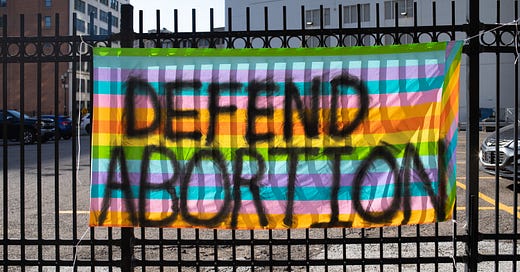Ballot Measure News
Four states made it official this week: Activists in Nevada, Arizona, Nebraska, and Arkansas collected enough signatures to put abortion on the ballot in November. A huge congratulations to everyone who worked their asses off organizing and petitioning. You all succeeded despite harassment, attacks from elected officials, and multi-million dollar smear campaigns. Just incredible work.
Protect Our Rights in Nebraska collected over 207k signatures—more than any ballot measure in the state’s history. Arizona activists also broke records: Arizona for Abortion Access gathered 820k signatures, more than twice the number needed to get abortion on the ballot. In Nevada, Nevadans for Reproductive Freedom also collected more than twice the 103k signatures they needed to qualify for the ballot, and in Arkansas, Arkansans for Limited Government made it over the finish line on Friday with more than 100k signatures.
Quick things to know about each state: Abortion rights is front and center in Arizona because of the 1864 ban that was upheld by the state Supreme Court. After a national backlash, the ban was repealed by the Arizona legislature—but not before reminding voters that Republicans want to go back to a time before women even had a right to vote.
Nevada joins the handful of pro-choice states seeking to add an extra layer of protections for abortion rights in their state constitution. And there’s been some controversy over the Arkansas measure, with major abortion rights groups declining to support the campaign because they don’t think it goes far enough. (Background here.) But it was Nebraska’s ballot measure that was in the news the most this week—largely because of conservative efforts to trick voters using a fake ‘pro-choice’ ballot measure.
Attacks on Democracy
Unfortunately, anti-abortion attacks on democracy warrant their own section this week. As I mentioned above, conservative groups in Nebraska—knowing that voters want abortion to be legal—decided to forgo simply opposing the state’s abortion rights measure. Instead, they launched a measure of their own, telling voters that it was ‘pro-choice’ while collecting signatures that would codify an abortion ban.
Protect Our Rights, Nebraska’s real pro-choice amendment, would protect abortion rights until ‘viability.’ But Protect Women and Children (that’s right, they chose a similar-sounding name) would actually enshrine the state’s 12-week abortion ban into the state constitution—making it virtually repeal-proof.
The fake measure is bankrolled by a small group of Republican multimillionaires, and managed to trick enough voters to get itself on the ballot this November. Still, dozens of Nebraskans have complained to the Secretary of State’s office. They report being misled by anti-abortion activists, who cajoled them into signing a petition they called pro-choice and promised was the “right” amendment.
The anti-abortion lies don’t stop in Nebraska, though. Just a few days ago, I told you about what Republicans are doing in Florida to trick voters out of supporting the abortion rights amendment there, Amendment 4. Florida Republicans are doing exactly what the Missouri GOP did with their pro-choice amendment: claiming that restoring abortion rights would cost the state untold amounts of money.
Essentially, citizen-led ballot measures in Florida need to include an estimate of what the amendment might cost the state; voters will see that number when they go to cast a ballot. But the Florida panel creating Amendment 4’s financial impact statement is comprised of some sketchy anti-abortion characters. One of the panel members, a Republican appointed by Gov. Ron DeSantis, says that litigation over the amendment could cost the state millions. Another panel member, who works for the ultra-conservative Heritage Foundation, says abortion being legal would lead to reduced state revenue because fewer people would live in Florida.
The truth? Abortion access is good for the economy. And they all know this! But the goal is to confuse voters, make life as difficult as possible for abortion rights activists, and push anti-abortion myths into the public consciousness.
If you missed my look back at the last two years of Abortion, Every Day, make sure to check it out. In a moment when everything is so difficult, it’s good to remind ourselves of all we’ve accomplished together!
State News
Since the Iowa Supreme Court upheld a 6-week abortion ban last week, we’ve been in desperate need of some positive news out of the states. So let’s talk about Wisconsin!
The Wisconsin Supreme Court agreed to hear two cases this week that will likely end up protecting abortion rights in the state. How we got here is a little complicated, so click here and here if you want in-depth context. But the short version is that both of these lawsuits challenge an 1849 law that Republicans say bans all abortion in the state.
One suit was brought by the state’s Democratic Attorney General Josh Kaul, who argues the law is too old to enforce. (Like Arizona’s 1864 abortion ban, it was enacted before women even had a right to vote.) The other was filed by Planned Parenthood of Wisconsin, which is asking the state Supreme Court to rule that the 1849 law is unconstitutional because protections for “life, liberty and the pursuit of happiness” include abortion rights.
Because the Wisconsin Supreme Court is now under liberal control, abortion rights activists have a very good chance of winning. You love to see it.
We also had some good news this week out of Michigan, where ACLU Michigan announced that it’s filing a suit to challenge the state’s ban on Medicaid coverage for abortion. The group agues that the prohibition violates a new amendment protecting abortion rights in the state constitution. The ACLU also argues, rightly, that the ban discriminates against people with low-incomes.
And remember, it was just last week that a Michigan court did away with a 24-hour waiting period for abortion, also thanks to those new abortion protections in the state constitution. It’s a good reminder that these protections can go a long way.
We saw less terrific news in Kansas this week, where two new abortion restrictions went into effect: one that makes ‘coerced’ abortion a felony, and another that would mandate doctors ask abortion patients invasive questions and then report those answers to the state. (The latter is a strategy I’ve long warned about.) Thankfully, there was some better news out of the state on Friday, when the Kansas Supreme Court struck down two other abortion restrictions. I’ll get into the details of that ruling in tomorrow’s daily report.
2024 Shit Show
America was still reeling this week from our presidential debate nightmare, in which President Joe Biden floundered badly. His alarming performance sparked multiple calls for the president to step down as the Democratic candidate, but Biden’s campaign wasn’t hearing it. In fact, deputy campaign manager Rob Flaherty sent a memo to supporters, calling those advising Biden to pull out of the race, the “bedwetting brigade.”
Biden sat down for an interview with ABC News' George Stephanopoulos to quell concerns, but Axios reports that it didn’t do much to change people’s minds on the Hill.
Abortion, Every Day was lucky enough to publish a guest column from Renee Bracey Sherman—author of the forthcoming book, Liberating Abortion—who has some thoughts about how we could have avoided this mess to begin with:
Meanwhile, conservatives have some worries about Donald Trump; namely, that he’s going to water down the Republican party platform on abortion. A group of anti-choice leaders sent Trump a letter, urging him to “make clear that you do not intend to weaken the pro-life plank.” This came the same week that that Trump’s campaign released a memo notifying platform committee members that they’ll be changing and shortening the document, and that POLITICO reported that the campaign blocked two anti-abortion activists from the RNC platform committee. So, it makes sense that they’re worried.
I’ll have more this week on the Republican platform and abortion because I think we’re going to be hearing a lot more about it in the coming weeks—it’s a perfect distraction. Trump knows that abortion rights are massively popular, and he’s been working hard to appear ‘moderate’ on the issue. Feigning ‘softening’ on the issue by changing the platform would be, unfortunately, a smart strategy.
As I noted this week, a move like this could win Trump the votes he’s most desperate for: women who supported him in 2016 but declined to do so in 2020. And in a moment when Trump is trying to distance himself from Project 2025, making a big deal about editing the Republican platform could help his campaign change the subject.
What Conservatives Are Saying
There was a whole lot of anti-abortion messaging this week, so let’s hop into it. After the Iowa Supreme Court upheld a 6-week abortion ban, decimating access in the region, Republicans tried to shield themselves from blame by relying on a single phrase: “the will of the people.” (This is a messaging trend I’ve been flagging for a while now.)
I pointed out last week that Gov. Kim Reynolds claimed the state Supreme Court upheld the “will of the people,” for example, even though over 60% of people in the state want abortion to be legal in all or most cases. But Reynolds said “Iowa voters have spoken clearly through their elected representatives.” Iowa House Speaker Pat Grassley said something similar, claiming in a statement, “The Legislature is elected by the people, and for too long, the courts have stood in the way of Iowans having their voices heard on this matter.”
The idea is that voters already made their voices heard on abortion by electing lawmakers (voter suppression and gerrymandering be damned), so they don’t need a direct say on abortion rights.
The other talking point that made an appearance a few times this week was the focus on the term ‘health care provider’ in proposed abortion rights amendments. Anti-abortion lawmakers and activists in both Florida and Arizona claimed that pro-choice measures contained the term ‘health care providers’ as a way to allow anyone at all to perform abortions.
Chris Spencer, one of the Republicans creating a financial impact statement for Amendment 4 in Florida, said the term would mean that “speech pathologists or dental hygienists could perform abortions.” And Arizona anti-abortion activist Dawn Grove said this week that language about ‘health care providers’ would allow chiropractors, dentists, or veterinarians to provide abortions.
The Week in Numbers
Indiana has one of the nation’s strictest abortion bans, but 64% of voters in the state believe abortion should be legal in all or most cases.
A CBS News/YouGov poll taken after the debate found that 72% of voters believe Biden should not be running for president (up from 63% in February).
Texas’ abortion ban is costing the state’s economy $23 billion a year.
Four anti-abortion activists were sentenced under the FACE Act for their role in blocking access to a Tennessee clinic.
And Connecticut has seen a 150% increase in people coming from out-of-state for abortions.
Don’t Forget
In the interest of thinking beyond week-to-week, here are some important stories from the last month or so that we should still be thinking about and keeping an eye on:
Infant mortality jumped seriously in Texas after the state passed a total abortion ban—largely because the state forces women to carry doomed pregnancies to term. The (disgusting) anti-abortion response to the data was to claim that the law was simply protecting ‘disabled children’. Republicans want us to forget about this data as soon as possible, so let’s not give them the satisfaction.
A Democratic lawmaker and abortion rights attorney in Tennessee are challenging the state’s anti-abortion travel ban, arguing that it violates the First Amendment. This comes after a similar free speech challenge blocked the travel ban in Idaho. These so-called ‘anti-trafficking’ policies are already a big legislative trend, and what happens in the courts is going to be a big fucking deal.
There will be no Republican women in the South Carolina Senate next session, after the three GOP lawmakers who blocked a total abortion ban were ousted for their disloyalty. This was a warning to Republican politicians considering taking a stand against abortion bans—one that seems likely to impact female legislators the most. I’m curious whether we’ll see similar situations play out in other states.
Keep reading with a 7-day free trial
Subscribe to Abortion, Every Day to keep reading this post and get 7 days of free access to the full post archives.






